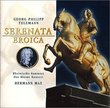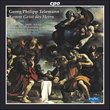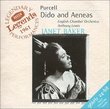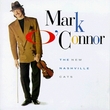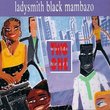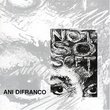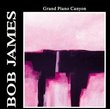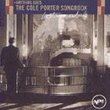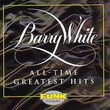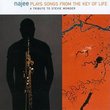| All Artists: Klaus Mertens, Georg Philipp Telemann, Hermann Max, Das Kleine Konzert, Rheinische Kantorei, Monika Frimmer, Veronika Winter, Nico van der Meel Title: Telemann: Die Auferstehung und Himmelfahrt Jesu Members Wishing: 1 Total Copies: 0 Label: Capriccio Release Date: 4/8/2008 Album Type: Import Genre: Classical Styles: Opera & Classical Vocal, Historical Periods, Baroque (c.1600-1750) Number of Discs: 1 SwapaCD Credits: 1 |
Search - Klaus Mertens, Georg Philipp Telemann, Hermann Max :: Telemann: Die Auferstehung und Himmelfahrt Jesu
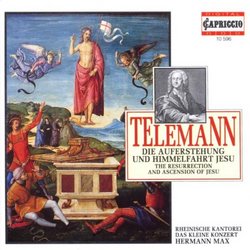 | Klaus Mertens, Georg Philipp Telemann, Hermann Max Telemann: Die Auferstehung und Himmelfahrt Jesu Genre: Classical
|
Larger Image |
CD DetailsSimilar CDsSimilarly Requested CDs
|
CD ReviewsTriumph! Triumph! Giordano Bruno | Wherever I am, I am. | 09/03/2009 (5 out of 5 stars) "Here's my indefensible generalization of the morn. There are two kinds of originality in music: 1) breaking the rules so convincingly that your experiments become new rules; Schoenberg is an example. 2) extending the rules to hitherto unattempted situations; Gesualdo is a prime example. The latter usually earns the composer a reputation for mastery among his/her contemporaries; the former often 'enjoys' more posthumous acclaim.
Baroque composers certainly both broke and extended the rather mathematical rules of their musical idiom. JS Bach was the supreme extender, the learned contrapuntalist whose musical intellect pushed him to encyclopedic works like The Art of Fugue. I would argue that Georg Philipp Telemann was equally a breaker and an extender. His discarding of the rigid rules of recitativo seco, in favor of free syllabic rhythms, became the common practice of Mozart. His extension of operatic drama into sacred oratorio, far bolder than Handel's, gave his mature works both profundity and grandeur. "Die Auferstehung und Himmelfahrt Jesu" (The Resurrection and Ascension) is a work of grandeur, a musical expression of the triumph of humanity over mortality through religious faith. Three times in the course of the music, the chorus in fact sings "Triumph! Triumph!", an emotion proclaimed proudly by trumpets and tympani, and the word Triumph is repeated often in the first tenor aria. "The grave is empty" sings the soprano triumphantly. "Death, where is thy sting?" the chorus exults. "God leads forth with exuberance and the Lord with trombones! Sing praise! Sing Praise!" and the trombones give voice to joy, echoed by the Angel Choir. "Wunder! Wunder! Hallelujah!" What's the German word for 'triumph'? In this text, it's 'Triumph', an offensive neologism according to some of Telemann's contemporary critics. Karl Wilhelm Ramler, the poet whom Telemann commissioned to write the libretto for this oratorio, was not uncontroversial in his literary milieu. Thus there's no record that "Auferstehung und Himmelfahrt" was ever performed in a church; its militant assertion of Man's share of grandeur may have been unacceptable to pietistic conservatives. Instead, this composition was intended for a public performance in a secular concert hall, for which tickets were sold. Such a venue freed Telemann from the constraint of 'inserting' his music in the fixed order of a worship service, and allowed him to structure the composition as a dramatic unity. This larger structure is splendidly established in the first five movements. The orchestra prepares a thoughtful mood in a somber minute-and-a-half prelude; the chorus expresses a sorrowful plea for help; suddenly "the earth quivers" in a basso recitativo that expresses astonishment in both words and music; the bass then sings an aria of musical/pictorial wonder and hope; finally the chorus erupts with its first proclamation of Triumph. Most of the Biblical narrative of the resurrection and later ascension is delivered in semi-dialogue recitativo-arioso shared among the soloists with Telemann's unrivaled attention to the rhythms of his language. The first duet (track 9) allows the paired sopranos to add a bit of sweetness and sentimentality - something for the children - to the celebration. Another recitativo portrays the Biblical doubts of the Disciple Thomas, a tenor, who thereafter sings an eloquent ode of gratitude. Soon the paired sopranos announce, in a duet that sounds remarkably Haydesque, the Opening of the Gates of Heaven and the Crowning of the Lord in Glory: "Triumph! Give God the Honor! Hail our God and His Son!" Thereafter it's all rousing chorus and orchestra, trumpets and drums, dances and marches parading toward the hallelujah climax. The same text was later set by other composers, most notably C.P.E. Bach. The 'Berlin' Bach's setting is equally splendid in detail but, to my ears, lacks the onrushing dramatic unity of Telemann's. It remains a program of lovely items heard in succession. Even though I do not share Herr Telemann's eschatology, I find myself excited, elevated, exalted by his musical assertion of the triumph of Life. I'm equally excited by Hermann Max and his Kleine Konzert in their performance of this detailed, demanding score. This is one of Max's earlier recordings - 1995 - but the choral and instrumental clarity is impressive. Bass Klaus Mertens, the indispensible, sings more expressively for Max than for other highly-renowned Dutch and English conductors. Alto Matthias Koch and tenor Nico van der Meel deliver vibrant performances. The dueting sopranos, Monika Frimmer and Veronika Winter, are probably not as virtuosic as their counterparts in more recent recordings by Das Kleine Konzert, but they're artful enough." |

 Track Listings (24) - Disc #1
Track Listings (24) - Disc #1